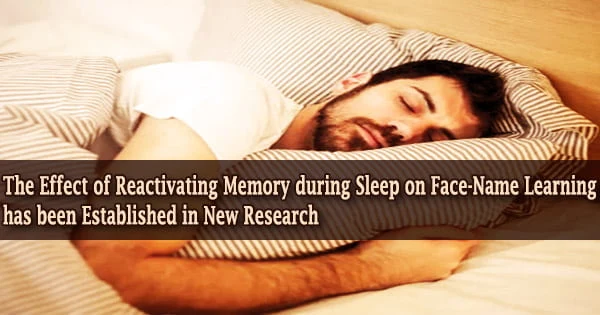For people who have trouble remembering names but never forget faces, the solution could be as close as your pillow. The effect of reactivating memory during sleep on face-name learning is the first to be documented, according to new research from Northwestern University.
When people’s memories of newly taught face-name connections were reactivated while they were sleeping, the researchers discovered that their name recall improved dramatically. Uninterrupted deep sleep was crucial to this progress.
“It’s a new and exciting finding about sleep because it tells us that the way information is reactivated during sleep to improve memory storage is linked with high-quality sleep,” said lead author Nathan Whitmore, a Ph.D. candidate in the Interdepartmental Neuroscience Program at Northwestern.
The paper, “Targeted memory reactivation of face-name learning depends on ample and undisturbed slow-wave sleep,” will publish on 12th January 2022 in the Nature partner journal NPJ: Science of Learning.
Ken Paller, professor of psychology and director of the Cognitive Neuroscience Program at Northwestern University’s Weinberg College of Arts and Sciences, is the paper’s senior author. Adrianna Bassard, a Ph.D. candidate in psychology at Northwestern, was also a co-author on the paper.
This new line of research will let us address many interesting questions like whether sleep disruption is always harmful or whether it could be used to weaken unwanted memories. At any rate, we are increasingly finding good reasons to value high-quality sleep.
Ken Paller
Memory reactivation did not help and may even be harmful for study participants with EEG data (a recording of electrical activity in the brain picked up by electrodes on the scalp) that indicated interrupted sleep.
The reactivation resulted in a relative improvement of a little over 1.5 more names recalled in those who slept uninterrupted during the precise times of sound presentations.
The experiment involved 24 people aged 18 to 31 who were asked to memorize the faces and names of 40 students from a hypothetical Latin American history class and another 40 students from a hypothetical Japanese history class. They were asked to produce the name that went with each face when it was shown again.
Participants took a snooze after the learning exercise while the researchers used EEG measurements to carefully examine brain activity. Some of the names were gently played on a speaker with music connected with one of the classes when participants reached the N3 “deep sleep” level.
When the participants awoke, they were retested on their ability to recognize the faces and recall the names associated with each one. The findings on the link between sleep disruption and memory accuracy are interesting, according to the researchers, for several reasons.
“We already know that some sleep disorders like apnea can impair memory,” said Whitmore. “Our research suggests a potential explanation for this frequent sleep interruptions at night might be degrading memory.”
In order to learn more about the underlying brain mechanisms, the lab is currently doing a follow-up study to revive memories and intentionally interrupt sleep.
“This new line of research will let us address many interesting questions like whether sleep disruption is always harmful or whether it could be used to weaken unwanted memories,” said Paller, who also holds the James Padilla Chair in Arts & Sciences at Northwestern. “At any rate, we are increasingly finding good reasons to value high-quality sleep.”





